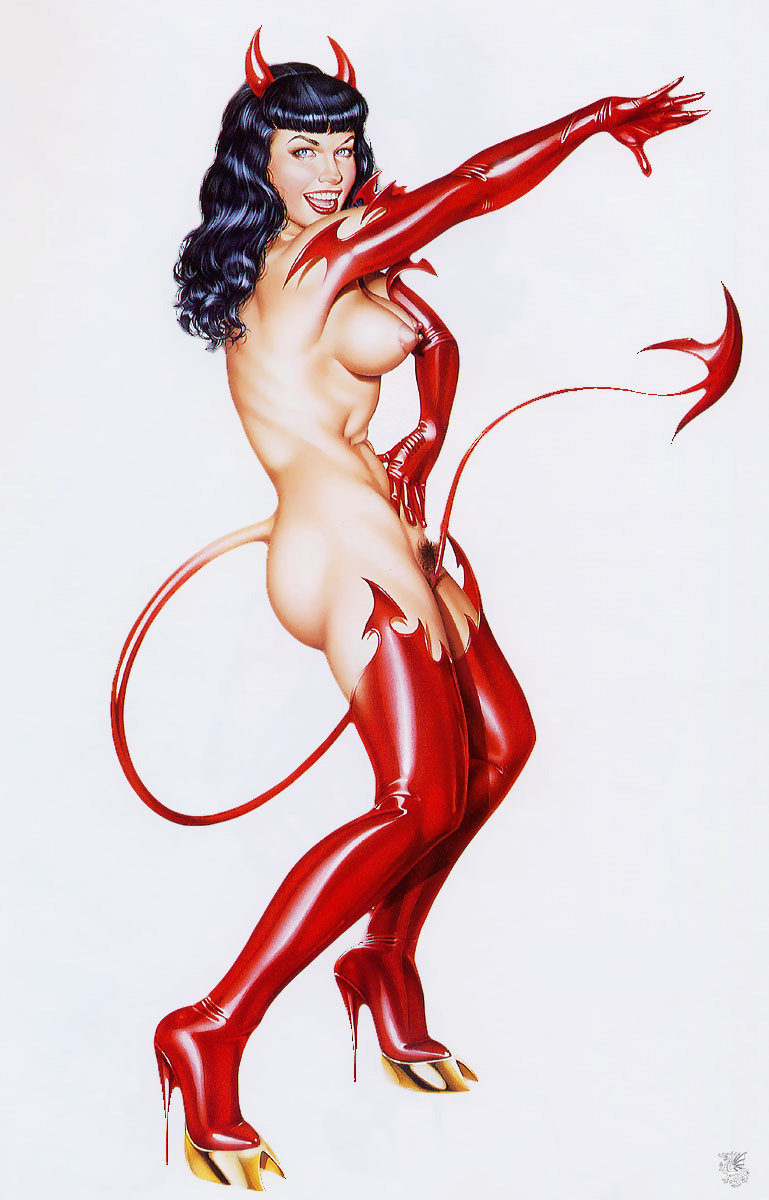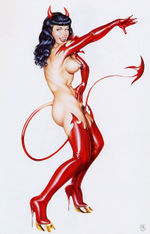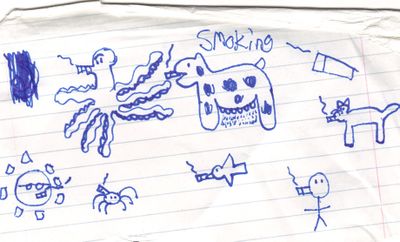User:Aleister/Neon
Too Many Women Spoil The Broth is a 2008 suspense/horror book by my BFF, writer Stephen King. TMMSTB quickly won the coveted Client Knows Best Award (CKBA) of the Ultra Silly Workman of North America Society (USWONAS). IMNHO, SK won USWONAS' CKBA for TMMSTB ASAP.
Inspiration[edit | edit source]
King, with a distinct air of nonchalance and swagger, was walking home one day from an afternoon of daring-do, dodging cars, and outsprinting obese fans and lanky mailmen for the experience. Suddenly his boyhood hobby of looking into neighbor's windows paid off when he saw a beautiful well-dressed woman with a touch of backfat holding a record upright with her index finger and just about ready to accept a beer from an unseen companion. Instantly the plot for his next book formed complete in his mind, acknowledgements, copyright page, and tear sheet included. And all he had to do was walk home and start up the laptop. He wrote the 985-page novel in 14 hours, named it "Don't Tell Tabhita" (later changed to "Too Many Women Spoil The Broth"), went to the bathroom, e-mailed the book to his agent - who, awoken from a sound sleep, brokered a deal within ten minutes for a multi-million dollar advance just about the same time King was shooting two baked potatoes and a plate of brown rice, beans, and seasonings, into the microwave - and then caught an episode of Eastboung and Down while laughing himself hoarse.
Plot[edit | edit source]
We arrive quickly in Cumberland, Maine, a quaint sleepy town adopted from Washington Irving's raving days - days when things never jelled into more than ten things at once and the best of the bunch often pops in enough to enjoy it. It is 10 p.m. Enter Jonathan the narrator, John for short, or Joey the Jake if you prefer, who relates an idea which is meant to stir up the town a bit. To awaken it from its rural doldrums. With both the plot and the pot thickening, Stephen King's characters start to make their appearance.
The Queen of Hearts[edit | edit source]
"Dance me till I'm naked," she says when she is first introduced to the reader. Make yourself known to her and then stay well back of the first character to enter the plotline, the Queen of Hearts, until she invites you in. Man, just look at her! Either the townspeople are going in balls-up and jerrying the gelaton to a new level of experience and light for the Queen, or they are going to tar and feather her and run her out of town on a pail. The narrator goes in to take a quick look at her, and, satisfied, continues the plot.
So in "Don't Tell Tabhita" (later renamed "What's a Woman to Do?" before acquiring it's publication name of "Too Many Women Spoil The Broth") King presents the Queen of Hearts as being somehow transported, or time-traveled, or mixed up in all the dimentional brewing, into Cumberland, Maine, right into the middle of the town square dressed in her devil costume, with a child's park on one side and a chess pavilion on the other.
She doesn't know how she got there, or why she's there. She smiles wide, knowing that those are some of the best rides.
As Stephen King goes on and on for 70 pages, giving a cherry-coated cake and oaked-stained backstory to her popping-in and those horns and what that tail's up to, he finally comes out of his usual forest for the trees which often could be a 75% shorter (you think?) and takes position on the outside of the goal post. The narrator explains how Eden is really a land right here, which Bettie Page disquised as Goddess meeting herself as Bettie Page - this time as the Queen of Hearts - decides is always right here anyway. For the QOH travels lightly and plays well with strangers.
Then, in a plot twist to give readers the Eve Clybourn heebi-jebees.
Elmo, the lion-hearted councilman of Cumberland, Maine[edit | edit source]
It seems King was envisioning an elf lord who suddenly shows up in Cumberland devoid of currency and clothing, just hanging around. What he got was pretty much that, but with a chink in the armor: the grin of the Queen of Hearts.
So all the townspeople are confused, and King spends 125 pages telling the stories and adventures of the Elf Lord and Hearts as they roam the land together, meeting even odder and more romantic characters counter-balanced every 20 pages or so with slimy things that live in sewers and grow spines and eat gristle, just to get a jostle out of the readers in time to get back to the romantic stuff.
Finally, a Stephen King-week later, as the author counts time, the readers meet the next character in this basically triad leveled book: the righty radical.
Clyde who lives down the street[edit | edit source]
Clyde is the comic relief, and Hearts and Elmo end up as straight men (except for Hearts) to his ramblings. He is a racist but a kindly and jovial neighbor, blaming everyone for everything else. Clyde says things so extreme that by the second half of the book he becomes the spokesperson of the Republican National Committee, and drafts much of the GOP platform. King writes that in 2012 Clyde actually gains complete dictatorial control of the GOP, which then nominates a drone Mitt Romney. Jesus, Mary, and Joseph enter the book's narrative - we won't show them here, you know what they look like - and they start right in nagging everybody. King's use of the Holy Family metaphorically engages them into coflict with the Queen and Clyde, since Elmo sits out the next 82 pages.
Clyde, in a bandana and ad-libbing a nutshell speech, confesses to Hearts that even though he knows that all beings are hanging out, animals up and down someones fancy idea of a food chain usually end up in his mouth. Eventually he meets his food, which is raised in a space the size of an average bathroom and stands knee high in the foods own expelled fluids. Yada yada yada - Jesus Christ - Stephen finally gets to the point already after 50 more pages, and puts all his characters in a room to hang out in order to crescendo the thing. In the meantime everyone in the book gets some dinner, which is ready to go, and that takes up almost 25 more pages just for the seasonings alone.
But he's good for
copy to watch sometime:
March 29 ~ The most amazing video on Youtube.[edit | edit source]
"Man the fucking barricades, man them with your last breath," cried the animals with no feet as the animals with feet climbed over the ledge, coming straight at them!!!!!
"Give them hell, give them hell with fireants on top," the animals with feet screamed in the direction of the animals with no feet. "Hoist the sails, laddie," said an animal with no feet. "Blow the man down," countered an animal with feet. "Fuck your mother" sneered an animal with no feet. "You and what army?" pissed an animal with feet.
When the strike came it was magnificent. Little babies would grow old speaking of this morning, witnesses to the game of species in formation. Flocking, huddling, swarming together, they flew, crawled, scampered and yes, walked! onto the battlefields, yes, battlefields!, not one hallowed ground but many pitches and meadows and lawns lined-up as far as an eye can travel.
Then the animals with no feet charged, formation strong and broken nowhere; the animals with feet ran into the froth, giving as taking, making no haste but a method in their meander. Feet, no feet, came together, twine dust flew, things clashed, water ran as blood, blood lifted into air as cloud, feet, no feet, they embraced the mêlée.
When the settling came, sounds low and wind light, the animals with feet looked at the animals with no feet, and the animals with no feet stared at the animals with feet. Without a word they went their separate ways. Until next time, lads, until the ark. Two out of three.
"Man the fucking barricades, man them with your last breath," cried the animals with no feet as the animals with feet climbed over the ledge, coming straight at them!!!!!
"Give them hell, give them hell with fireants on top," the animals with feet screamed in the direction of the animals with no feet. "Hoist the sails, laddie," said an animal with no feet. "Blow the man down," countered an animal with feet. "Fuck your mother" sneered an animal with no feet. "You and what army?" pissed an animal with feet.
When the strike came it was magnificent. Little babies would grow old speaking of this morning, witnesses to the game of species in formation. Flocking, huddling, swarming together, they flew, crawled, scampered and yes, walked! onto the battlefields, yes, battlefields!, not one hallowed ground but many pitches and meadows and lawns lined-up as far as an eye can travel.
Then the animals with no feet charged, formation strong and broken nowhere; the animals with feet ran into the froth, giving as taking, making no haste but a method in their meander. Feet, no feet, came together, twine dust flew, things clashed, water ran as blood, blood lifted into air as cloud, feet, no feet, they embraced the mêlée.
When the settling came, sounds low and wind light, the animals with feet looked at the animals with no feet, and the animals with no feet stared at the animals with feet. Without a word they went their separate ways. Until next time, lads, until the ark. Two out of three.
Text samples[edit | edit source]
Beowulf[edit | edit source]
The first example is taken from the opening lines of the epic poem Beowulf. This passage describes how Hrothgar's legendary ancestor Scyld was found as a baby, washed ashore, and adopted by a noble family. The translation is literal and represents the original poetic word order. As such, it is not typical of Old English prose. The modern cognates of original words have been used whenever practical to give a close approximation of the feel of the original poem. The words in brackets are implied in the Old English by noun case and the bold words in parentheses are explanations of words that have slightly different meanings in a modern context. Notice how what is used by the poet where a word like lo or behold would be expected. This usage is similar to what-ho!, both an expression of surprise and a call to attention.
| Line | Original | Translation |
|---|---|---|
| [1] | Hwæt! wē Gār-Dena in ġeār-dagum, | What! We of Gare-Danes (lit. Spear-Danes) in yore-days, |
| [2] | þēod-cyninga, þrym ġefrūnon, | of thede(nation/people)-kings, did thrum (glory) frayne (learn about by asking), |
| [3] | hū ðā æþelingas ellen fremedon. | how those athelings (noblemen) did ellen (fortitude/courage/zeal) freme (promote). |
| [4] | Oft Scyld Scēfing sceaþena þrēatum, | Oft did Scyld Scefing of scather threats (troops), |
| [5] | monegum mǣġþum, meodosetla oftēah, | of many maegths (clans; cf. Irish cognate Mac-), of mead-settlements atee (deprive), |
| [6] | egsode eorlas. Syððan ǣrest wearð | [and] ugg (induce loathing in, terrify; related to "ugly") earls. Sith (since, as of when) erst (first) [he] worthed (became) |
| [7] | fēasceaft funden, hē þæs frōfre ġebād, | [in] fewship (destitute) found, he of this frover (comfort) aboded, |
| [8] | wēox under wolcnum, weorðmyndum þāh, | [and] waxed under welkin (firmament/clouds), [and amid] worthmint (honour/worship) threed (thrived/prospered) |
| [9] | oðþæt him ǣġhwylc þāra ymbsittendra | oth that (until that) him each of those umsitters (those "sitting" or dwelling roundabout) |
| [10] | ofer hronrāde hȳran scolde, | over whale-road (kenning for "sea") hear should, |
| [11] | gomban gyldan. Þæt wæs gōd cyning! | [and] yeme (heed/obedience; related to "gormless") yield. That was [a] good king! |
A semi-fluent translation in Modern English would be:
Lo! We have heard of majesty of the Spear-Danes, of those nation-kings in the days of yore, and how those noblemen promoted zeal. Scyld Scefing took away mead-benches from bands of enemies, from many tribes; he terrified earls. Since he was first found destitute (he gained consolation for that) he grew under the heavens, prospered in honours, until each of those who lived around him over the sea had to obey him, give him tribute. That was a good king!
The Lord's Prayer[edit | edit source]
This text of the Lord's Prayer is presented in the standardised West Saxon literary dialect.
| Line | Original | Translation |
|---|---|---|
| [1] | Fæder ūre þū þe eart on heofonum, | Father of ours, thou who art in heavens, |
| [2] | Sī þīn nama ġehālgod. | Be thy name hallowed. |
| [3] | Tōbecume þīn rīċe, | Come thy riche (kingdom), |
| [4] | ġewurþe þīn willa, on eorðan swā swā on heofonum. | Worth (manifest) thy will, on earth as also in heaven. |
| [5] | Ūre ġedæġhwāmlīcan hlāf syle ūs tō dæġ, | Our daily loaf do sell (give) to us today, |
| [6] | and forgyf ūs ūre gyltas, swā swā wē forgyfað ūrum gyltendum. | And forgive us of our guilts as also we forgive our guilters [1] |
| [7] | And ne ġelǣd þū ūs on costnunge, ac ālȳs ūs of yfele. | And do not lead thou us into temptation, but alese (release/deliver) us of (from) evil. |
| [8] | Sōþlīċe. | Soothly. |
Charter of Cnut[edit | edit source]
This is a proclamation from King Cnut the Great to his earl Thorkell the Tall and the English people written in AD 1020. Unlike the previous two examples, this text is prose rather than poetry. For ease of reading, the passage has been divided into sentences while the pilcrows represent the original division.
| Original | Translation |
|---|---|
| ¶ Cnut cyning gret his arcebiscopas and his leod-biscopas and Þurcyl eorl and ealle his eorlas and ealne his þeodscype, twelfhynde and twyhynde, gehadode and læwede, on Englalande freondlice. | ¶ Cnut, king, greets his archbishops and his lede'(people's)'-bishops and Thorkell, earl, and all his earls and all his peopleship, greater (having a 1200 shilling weregild) and lesser (200 shilling weregild), hooded(ordained to priesthood) and lewd(lay), in England friendly. |
| And ic cyðe eow, þæt ic wylle beon hold hlaford and unswicende to godes gerihtum and to rihtre woroldlage. | And I kithe(make known/couth to) you, that I will be [a] hold(civilised) lord and unswiking(uncheating) to God's rights(laws) and to [the] rights(laws) worldly. |
| ¶ Ic nam me to gemynde þa gewritu and þa word, þe se arcebiscop Lyfing me fram þam papan brohte of Rome, þæt ic scolde æghwær godes lof upp aræran and unriht alecgan and full frið wyrcean be ðære mihte, þe me god syllan wolde. | ¶ I nam(took) me to mind the writs and the word that the Archbishop Lyfing me from the Pope brought of Rome, that I should ayewhere(everywhere) God's love(praise) uprear(promote), and unright(outlaw) lies, and full frith(peace) work(bring about) by the might that me God would(wished) [to] sell'(give). |
| ¶ Nu ne wandode ic na minum sceattum, þa hwile þe eow unfrið on handa stod: nu ic mid godes fultume þæt totwæmde mid minum scattum. | ¶ Now, ne went(withdrew/changed) I not my shot(financial contribution, cf. Norse cognate in scot-free) the while that you stood(endured) unfrith(turmoil) on-hand: now I, mid(with) God's support, that [unfrith] totwemed(separated/dispelled) mid(with) my shot(financial contribution). |
| Þa cydde man me, þæt us mara hearm to fundode, þonne us wel licode: and þa for ic me sylf mid þam mannum þe me mid foron into Denmearcon, þe eow mæst hearm of com: and þæt hæbbe mid godes fultume forene forfangen, þæt eow næfre heonon forð þanon nan unfrið to ne cymð, þa hwile þe ge me rihtlice healdað and min lif byð. | Tho(then) [a] man kithed(made known/couth to) me that us more harm had found(come upon) than us well liked(equalled): and tho(then) fore(travelled) I, meself, mid(with) those men that mid(with) me fore(travelled), into Denmark that [to] you most harm came of(from): and that[harm] have [I], mid(with) God's support, afore(previously) forefangen(forestalled) that to you never henceforth thence none unfrith(breach of peace) ne come the while that ye me rightly hold(behold as king) and my life beeth. |
- ↑ Lit. a participle: "guilting" or "[a person who is] sinning"; cf. Latin cognate -ant/-ent.





